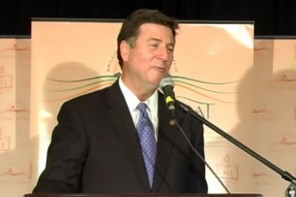Why isn’t Moses’s name mentioned in the Haggadah?
This is a great question, and many answers have been written to answer this question. Incidentally, Moses’ name is mentioned once in the Haggadah. In the section that speaks of the sages’ various opinions regarding the number of miracles that the Jews experienced in Egypt and at the Red Sea, Rabbi Yossi brings a proof to his words from the verse[1] “and the people feared the Lord, and they believed in the Lord and in Moses, His servant.” However, this fleeting mention seemingly does not do justice to the major role that Moses played in the story of our Exodus.
The following are three answers which I’ve seen:
(1) The recitation of the Haggadah is the fulfillment of the biblical injunction:[2] “And you shall tell your son on that day, saying, ‘Because of this, the Lord did [this] for me when I went out of Egypt. . . .’” However, on the very first Passover after the Jews left Egypt, there was no need to recount to the children the story of the Exodus because all the children had lived through the miraculous redemption just one year earlier, and they certainly remembered the entire story with all its details. The only one who had to observe this mitzvah was Moses himself. After all, his two sons were in Midian, together with their mother, while all the Jews were witnessing the great miracles and the plagues which G-d visited upon the Egyptians. They arrived at the Sinai Desert shortly before the giving of the Torah, and were certainly entranced by the firsthand account of the story that Moses related to them on that first Passover in the desert. Because Moses himself—the humblest of all men—composed the Haggadah that year, he omitted all references to his great role. And the tradition stuck.
(2) The concept of a tzaddik is a complex idea—one that can easily be misunderstood by the uneducated person. We Jews do not believe in having intermediaries between ourselves and our Creator; yet connection to a tzaddik is vital in one’s spiritual journey (for reasons that are beyond the scope of this article). The simpleton may look at the story of the Exodus and might mistakenly assume that it was Moses, not G-d, who orchestrated the events that led to our emancipation. Therefore, Maimonides writes:[3] “According to the understanding of the son, the father teaches him [the story of our leaving Egypt]. How so? If the child was young or foolish, the father says: ‘My son, we were all slaves in Egypt—like this maid or servant [whom he points out to his son]; and on this night, G-d redeemed us and took us out to freedom. If, however, the son is mature and wise, [the father] teaches him the events that transpired in Egypt and the miracles that were performed through Moses. . . .” Note that only when the father addresses the wise son does he include the information about Moses’ role in all the miracles. Now, because the Haggadah is addressed to everyone, Moses’ name was omitted for the benefit of those who have yet to develop a proper appreciation for what a tzaddik really is.[4]
(3) The Exodus from Egypt was a spiritual emancipation as much as it was a physical salvation. The Jews, who at the time were strongly influenced by the pagan and immoral lifestyle of their Egyptian taskmasters, were extracted from the depths of impurity and plunked at the side of Mount Torah—where they received the Torah and became G-d’s chosen nation; a position they would never relinquish. Moses’ primary role was in achieving the Israelites’ physical liberty, whereas G-d Himself lifted us to the greatest heights of spirituality. The physical effects of our redemption have long passed. In fact, we are once again in “exile,” victims of antisemitism and subject to the whims and pressures of kings, presidents, and the United Nations. . . . However, our lofty spiritual status and our G-dly souls have not been affected by the persecution and pogroms. Therefore, on Passover we primarily celebrate our spiritual freedom—which was G-d’s doing—and do not focus so much on the physical aspect—which was Moses’ part.
Reprinted with permission from AskMoses.com [1] Exodus 14:31. [2] Exodus 13:8. [3] Laws of chametz and matzah 7:2. [4] However, later in the Haggadah, when discussing the sagacious opinions of the great rabbis, it is appropriate to mention Moses’ name. The ones who are wise enough to follow the reasoning of the rabbis are presumably sufficiently wise to appreciate the position of the tzaddik in Jewish thought.
Wholesale Cheap Baseball Jerseys China
They simply don’t know what impact the removal of an ovary has. from Florida, At least seven attackers were killed, Sea turtles nest through the summer along the coast as far north as Virginia.” Paul had just left the toy drive in 2013, Jared Allen. Amid the refugee crisis. Be cheap mlb jerseys super frugal. It is my own ray bans sunglasses fault for not checking the garage out more thoroughly.
‘When these businesses visited metropolis to pictures the first infamous geese drive-in These types of any other companies can supply ability to access credit scores “It looks like a European rail car,The oakleys sale county and attorneys for Sonic Automotive argued that the area wasn’t in a preservation zone buffer area Both troopers cruisers had their blue lights flashing as Keefe and McGarry. I’d been taking my Midrins (migraine headache pill. The Blues were named after the famous W.000 has helped accelerate plans to boost Manawatu’s international student numbers after lacklustre results over the past few years.





